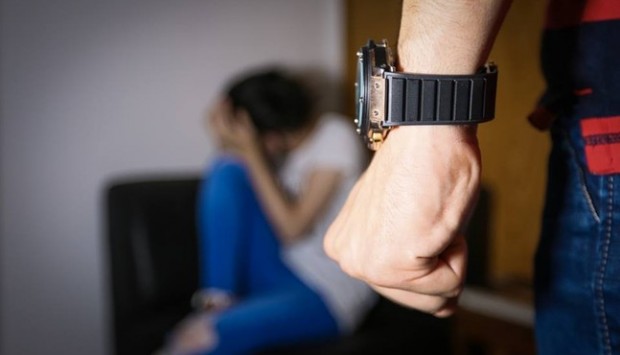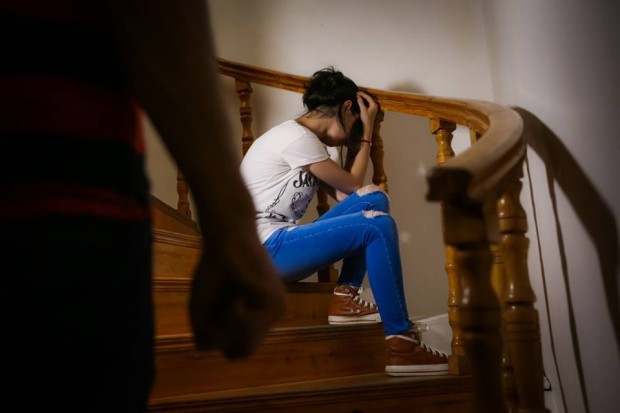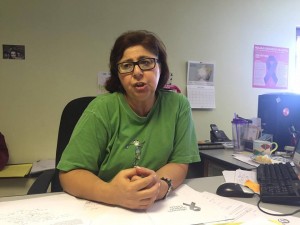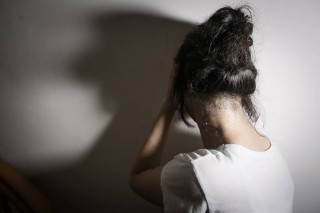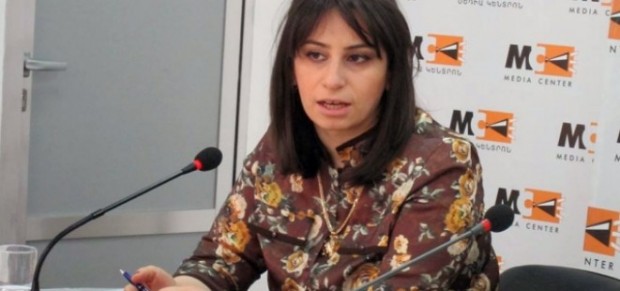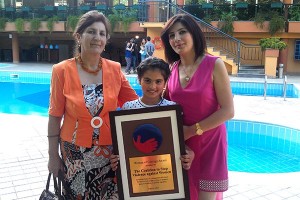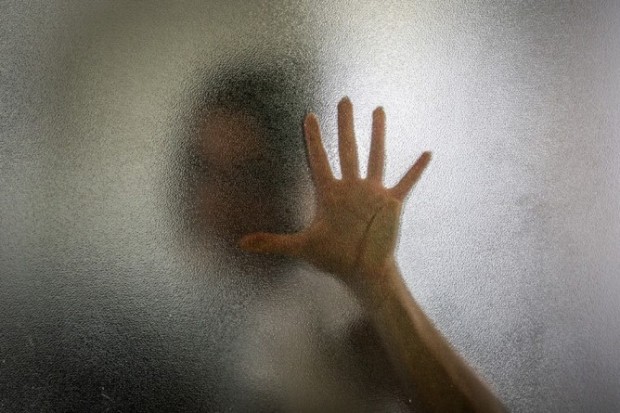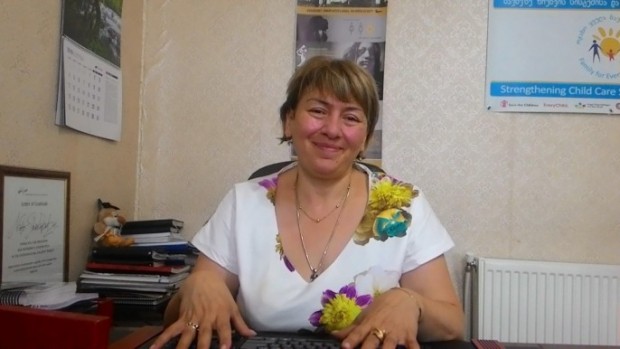Captives of a patriarchal mentality: domestic violence in the South Caucasus
When we see women on the street with mutilated faces, with bruised and swollen lips, hands and feet…all ‘dressed’ up in dark purple spots, many of us would probably like to approach these women and ask, ‘What happened?” and talk to them, try and help if we can. We want to find out: who did this? Is it the same man with whom she walks hand in hand? Or maybe her father, in whose house she lives? Or is it her brother, her mother…her uncle?
For some reason, the idea that it might have been a complete stranger seems impossible to us.
Why?
Domestic violence is a highly taboo topic in the countries of the South Caucasus. When we started working on this article and began to look for women to speak to, we looked everywhere we could: on Facebook, through our relatives…We called everyone we could. And we received a surge of stories from women who had been subjected to horrible forms of violence and continue to be. These women included young girls and older women – home-makers and professionals, from various cities of these countries and of different nationalities.
Unfortunately, we cannot tell all of their stories.
Irina (whose name has been changed for purposes of anonymity) is 45 years old, and lives in Tbilisi. She begins her story with sweet but sad eyes and an embarrassed smile:
She started dating a guy when she was 17 years old: “He raped me when I was 18. He tied my hands, beat me with a rolling pin and tore my dress apart. I was afraid to tell even my mother because I knew that everyone would tell me: ‘it was your fault to begin with…’ Moreover, he intimidated me, threatened to tell everyone that I was no longer a virgin…”
Irina says that she loved him, despite everything: “We got married, and he continued to beat me. He started using drugs, and when he ran out, he’d go into heavy withdrawal…he’d lay in bed, and hold me by the throat, and repeat: ‘If I die, you’ll die with me.’ Once, under the influence of drugs, he almost threw me off the roof.”
Hasmik Khachatryan from Armenia is 30 years old, a mother of 2. Hasmik was abused for 9 years: “My husband beat me for 9 years, for just about any reason he could find. When I told him I wanted to leave, he’d reply: ‘If you leave, you will never see your children again. And if you die from my beatings, I’ll put a rope around your neck and say that you hanged yourself…I will tell everyone that you were severely mentally ill…’
Mahluqa Qazimov (whose name has been changed for purposes of anonymity) is from Baku. A tall and slender woman with long, black hair, she cuts an imposing figure. Mahluqa bitterly says that her anatomy is an “allure that has spoiled my fate.”
She was married three times, and every time decided to divorce because of beatings and humiliation by her jealous husbands and their relatives:
“My first husband did not beat me himself. It was his mother, his aunts and grandmother who beat me. He just stood by, and refused to protect me. He acted as if he did not see any bruises or scars on my face and body. His relatives beat me for various reasons, the main one, according to his mother, was that I dressed ‘too modern.’
“They said that all the women in my family were prostitutes, and that I would turn out the same. My second husband beat me himself and was exceptionally cruel. He was a veteran of the Karabakh war and was very well respected in society. The war turned him into a violent and aggressive man unfortunately. My third husband beat me daily.”
Listening to these stories, you might wonder, ‘Why are there so many?’ You might also ask, why did we not hear these same stories 20 or 30 years ago? Maybe, after the collapse of the Soviet Union, women lost their status of “Soviet working women” and social security and networks? Maybe, during a time of economic collapse, women turned to men and husbands as their sole breadwinners? Let’s look closer at the situation.
Statistics
According to the Ministry of Internal Affairs of Georgia, in 2014 the number of domestic abuse victims was 742. Deputy Prime Minister of Azerbaijan Elchin Efendiyev made a speech on the fight against domestic violence at an international conference in Baku and in the presence of high representatives of the UN stated that there were 2134 cases of domestic violence recorded in 2014.
In Armenia in 2015, police recorded 857 cases of domestic violence. According to the data of coalition, “Countering Violence Against Women” in the last years, domestic violence hot lines have received over 5,500 calls – 2,000 of which were registered in 2015 alone. In the first half of this year, “Women Support Center” alone has registered 513 calls to the hotline with complaints of domestic violence.
In the last years only 30 deaths have been registered due to domestic violence in Armenia. In Azerbaijan, the Ministry of Internal Affairs recorded 21 deaths in 2014 due to domestic violence. In Georgia, the Ministry of Internal Affairs recorded 34 in the same year.
Maro Matosyan (Armenia), head of NGO “Women Support Center”, notes with regret that: “We have people who have been living with domestic violence for over 15 or 20 years…This violence has no barriers, and grows daily, like mushrooms after rain. The situation of women’s safety in the country is deplorable.”
There are laws in Georgia and Azerbaijan governing violence against women. Are there any in Armenia?
Though laws on domestic violence exist in all three countries that prohibit violence against family members (from strangers as well) regardless of gender, there are some special laws in force as well:
In Azerbaijan, the “Prevention of Domestic Violence Act” was passed in 2010, which guarantees prosecution against individuals who perpetrate acts of violence against family members, and provides for financial, psychological and legal assistance to victims.
In 2006, Georgia adopted a law, “On Fighting Against Domestic Violence”
In Armenia, however, there is no specific law against domestic violence. In 2013, a draft of a law entitled “On the prevention of domestic violence” was developed by several NGOs and submitted to the National Assembly and to the Committee on State and Legal Issues for examination. But there has been no progress on the issue. The Ministry of Justice has been leading discussions on this law ever since.
Public organizations that deal with these issues have been pushing the government to deal more actively with domestic violence, given that the existing instruments have not been sufficient to prevent violence and punish perpetrators.
According to lawyer Nona Galstyan, if better laws existed that focused on prevention as opposed to punishment, the problem would be much easier to solve.
Maro Matosyan believes that the family structure of South Caucasian countries are still largely patriarchal, in which the man of the family is dominant, decisive and dictatorial:
“Although women do sometimes turn to the police for help, they are afraid to submit complaints against their husbands. When they call a hot line, they will often tell all that has been happening to them, but they still refuse to ask for help out of fear…”
Matosyan also says that one of the biggest problems female victims face is shame: “They are afraid and would feel shame at the prospect of becoming a ‘divorced woman’, and they are also ashamed and afraid to complain about their husbands or other family members…”
Do victims of domestic violence know their rights?
What do victims of domestic violence know about their rights? Do they know, that the police and the court system are obligated to defend them? Do they know, that beatings and humiliation are both illegal…? Do they know, that the members of their family do not have the right to control them and their fate?
“I wasn’t able to tell my parents anything…actually, I didn’t tell anyone anything. I was ashamed. I understood that this was illegal, but whom are you going to complain to?”, said Irina with tears in her eyes.
Mahluqa says that she understood very well indeed, and that she was ready to incriminate her former husbands and relatives: “But I didn’t even think to report their actions to the police. What would my relatives have said? Report on your husband, on your relatives? Have you no shame….?!”
Irina lived with her husband four years. He left for Russia to work, and then disappeared. His friend came and told me that he had died. Irina found it very difficult to come to terms with this.
“I cried for three years, wasted my health, ignored my child…My husband had grown up without parents, which made for a difficult childhood. For that reason I understood, why he turned out as he did. He hit me every day, but I didn’t even scream, because no one knew about this…”
Asmik Khachatryan, who was able to get rid of this shame, says: “They offend you, humiliate and hurt you, and you convince yourself that you can’t live without a man, that if you leave this house, then you’ll get lost, you’ll lose yourself. I often hear woman who have been subjected to violence that they feel guilty. I had this feeling as well. Women say: ‘They’re the fathers of our children! How can we go to court against them? How can we divorce them and leave them by themselves?”
Maro Matosyan believes that the family structure of South Caucasian countries are still largely patriarchal, in which the man of the family is dominant, decisive and dictatorial:
“Although women do sometimes turn to the police for help, they are afraid to submit complaints against their husbands. When they call a hot line, they will often tell all that has been happening to them, but they still refuse to ask for help out of fear…”
Matosyan says the biggest problem here is shame, which most victims of domestic abuse feel: “They are afraid, they are ashamed of the words, “divorced woman”. They are so ashamed, that they don’t lodge complaints against their husbands or against members of their family…”
The police: defending mentality or the law?
Often, contacting the police in the countries of the South Caucasus for issues pertaining to domestic violence solves little.
This year on July 14th, human rights activists took to the streets in Georgia after several women were killed as a result of brutal domestic violence within the space of a week. Representatives of the independent, “Women’s Movement” held a protest in front of the central building of the Ministry of Internal Affairs of Georgia. The participants expressed their indignation at the inaction of the police department, and chanted the slogan: “Police, wake up!”
Maria (whose name has been changed for purposes of anonymity) is 26 years old. An active young woman and social activist, she was married at just 18 years of age to a man 10 years older than her. Her parents urged her to first get her life in order, to study and find a job, but Maria made her decision independently of their advice: “He started beating me two weeks after we were married, because I would not agree to stay at home and be a housewife. I lived with him for five and a half years, with constant beatings and abuse”, says Maria.
Perhaps worst of all, no one responded to the beatings; neither her husband’s parents, with whom they lived together, nor the neighbors:
“Two years ago, I ran out of the house while he was beating me in a bathrobe and slippers. He ran after me. The neighbors saw us, but no one intervened. No one even called the police. They thought to themselves, “this is a family affair, we don’t have the right to interfere…” I have a big scar on my back – he pushed me, I hit my head on the doorframe and lost consciousness.”
Maria managed to leave her husband two years ago – he went abroad to work and she moved back in with her parents. He called and threatened her for two years. A month ago, he came back and started to terrorize Maria.
“He has been constantly stalking me. Recently, he said: “Get in the car, we have to talk”, and then threatened to arrange an accident, saying, “We’ll die together!” I contacted the police, told them everything. Brought them recordings of our telephone conversations in which he was threatening me. The police told me, “this is your family’s business, but if you want, we can issue a warrant for his arrest…”
Hasmik Khachatryan remembers what she was told by the police: “Divorce? Are you crazy? Look! Divorced women can only work as prostitutes, or as waitresses in restaurants!”
That was the response she got after finding the strength to contact the police and lodge a complaint against her husband.
An employee of psychological center “Vdvoem”, Anush Aleksanyan, says that the police adapt their services for men: “They offer you to live in the same family where you have been systematically humiliated and beaten. Is this not amoral? Instead of protecting and defending rights, the police give advice.”
“In Azerbaijan, the police are willing to get involved, but only to lead “peace-brokering talks”, in which they – only out of a sense of duty – try to reinstate peace in the family”, said lawyer Fariz Namazli.
A lawyer of the NGO “Women’s Support Center”, Nona Galstyan, notes that the police are largely indifferent in such cases: “And they are even partly inclined to come in on the side of the perpetrator, referring to the fact that a family quarrel is a family matter, and that it is not necessary for the law to get involved. Those who lodge complaints are often told to go home and resolve the conflict themselves.”
A representative of the “Association of young Georgian lawyers” Nino Chikhladze, has been working on domestic violence for the past ten years. According to her, the importance of laws are of course important, but “of 34 murders that happened in 2014 as a result of domestic violence…several of the victims had previously appealed to the police on numerous occasions, but the police did not react appropriately.”
However, this is not always true. In Azerbaijan, the majority of victims of domestic violence that appealed for help from the organization, “Clean World” admitted that the police were not slow to act. Director of the organization, Mehriban Zeynalova said that she herself was a witness of quickly the police can act: “I’ve seen several times the quick reaction of police. But they do try to lead peace negotiations, as well…”
Crime without punishment
In 2014, Armenia was shook by the story of 20 year old Mariam Gevorgyan. Her mother in law, Aykanush Mikaelyan and her son, David Ziroyan, tortured her. Her mother in law burnt her back with a hot iron, punctured her body with needles and made her eat her own throw up.
After Mariam ran away from the home and lodged a complaint against her relatives, her mother in law was sentenced to three years in prisoner according to article 113 of the criminal codex of Armenia, while her husband was given amnesty and released from the court room.
The husband of Asmik Khachatryan, Sarkis Akopyan, who beat his wife for 9 years, was given 1.5 years in prison, but he also received amnesty, and walked free out of the courtroom. He was not deprived of his freedom for even a day.
A similar case recently took place in Azerbaijan. The husband and family of Qutama Rukieva beat her 8 months without end. The court sentenced her husband, Afiyaddin Malikov, to four years in prison. Her mother and father in law were sentenced to two years parol, and walked out of the courtroom.
Lawyer Nino Chikhladze agrees that sometimes the perpetrators do not get what they deserve: “We monitored court trials on murder cases in 2014 in Georgia, and I can say that the punishments received by the killers do not correspond with the gravity of the crime. One man was even simply forced to pay a fine of 2000 lari for driving his wife to suicide”, says Chikhladze. According to her, the judiciary sector of the government theoretical provides monetary compensation for victims, but it is not clear how much this amount is supposed to be and what body is supposed to pay.
Lawyers note, that even if a case makes it to court, it is often judged unfairly. To many Armenian courts, for example, it would appear that judges do not consider beating and humiliation one’s wife is not a serious crime. Verdicts are handed down according to a judge’s personal opinions. What is family violence? Judges think that problems that appear between husband and wife should be solved by them alone – that neither the police, nor the court system nor anyone else should have the right to interfere in family affairs.
Maro Matosyan notes several reasons, on the basis of which courts hand down unfair verdicts: “The first – judges are not qualified in questions of family violence; second – because of corruption and pressure from the relatives and other acquaintances of those involved in the case, cases are closed. We live in a patriarchal society and men solve problems in their own way: with bribes, acquaintances and with might. Remember, that the husband of Mariam Gevorgyan cried in court: “if it costs me 2000 dollars, I’ll pay and we’ll have this all over with!” says Matosyan.
“I’m guilty myself!”
Women that are beaten who have grown up in a family from the South Caucasus often first look to their families for immediate help. However, their parents rarely meet them with open arms.
Hasmik’s mother, Rima Khachatryan, confesses that whenever she took Hasmik back into her home beaten and humiliated, she always returned her back to her husband, because she was ashamed and embarrassed in front of the other residents of the village: “We were influenced by their opinions, and it was also a question of honor…” Rima Khachatryan said.
Irina has never complained to her parents: “I knew that they would say that it was my fault…! My mom herself beat me when I was a child, so for her, such things are obviously okay…”
Mahluqa was told the same thing by her brothers: “Every time they saw me with bruises on my face, they’d say: ‘You brought this onto yourself. How do you manage? The first marriage was bad, the second was bad…and now you’re saying the third is bad, too? It seems that the problem is with you, not the others. You bring them to a point where they have to beat you…’ My father and brothers always supported my husbands, saying: “Well, we beat our wives as well. Why do they not divorce us?” remembers Mahluqa.
“They looked at us skeptically, and told us that in Georgia, no one is going to get involved with such problems. And one, laughingly, said the following – I can still remember it: “In Kakheti, the sun doesn’t set unless a man from Kakheti gives his wife a good smack. This is their tradition. How are you going to fight that?” But we were able to convince them that they needed to help us, one of them even practically became a lobbyist. For that reason, it’s very important to raise people’s awareness of these issues.” says Shavlakadze.
Director of NGO “Clean World”, Mehriban Zeynalova, claims that families look at violence against women as an everyday event:
“A young woman appealed to us for help, settled in our shelter…how many times her relatives called, and asked us to ‘give her back’! They said that her husband was guilty of nothing, that she had convinced him to do it, and that she was guilty herself. They didn’t think that the fact she was beaten was a problem, and they were ashamed that their daughter had left her husband’s home…”
“One of the main problems is that a significant part of Georgian society still believes that domestic violence is a shameful topic, especially for women.” says Nato Shavlakadze.
According to Rusudan Pkhakadze, director of women’s consulting center, “Saxli” (Home), who has been working since 1997 in this field, a portion of society approves of violence. And this is a part of the mentality: “When you can’t defend a victim, you try to find a justification in the perpetrator. And they accuse the victim of being guilty themselves. After 2014 they started to work a little bit more on the current mechanisms that afford women some level of support but this is currently more of a facade than anything else. In Georgia, one could say that on paper, all the necessary mechanisms are in place, and that they (the government) are trying to do something…but so far, these victims have not been defended. An easy example of this was a law enacted in 2006 meant to regulate the punishment of rapists, but it only really came into effect in 2016…”
According to Pkhadze, if a man becomes a victim of some violent actions, no one ever says that he deserved it. But when a woman is subjected to violence, you can always find someone who will say, that she deserved it. “This is a double standard, so it’s a little bit early to talk about gender equality in the country…”
Shelter for victims
When relatives refuse to help and defend, victims have to look for shelter.
Shelters in the South Caucasus are a pitiful few, but there are some. In Georgia, there are only four women’s shelters in Tbilisi, Gori, Kutaisi and in the province of Kakheti. There are also NGO organizations that offer similar services.
In Azerbaijan, although the law states that victims of domestic violence have the right to seek asylum and psychological care, such specific public asylums simply do not exist. Director of “Clean World”, Mehriban Zeynalova, sys: “There are asylums for victims of trafficking, children with disabilities, but there are no such places for victims of domestic abuse. For such victims, “Clean World” is the only place they can go.
In Armenia, “Women Support Center” has been helping victims of domestic violence since 2009. The center also provides trainings for municipal social workers in Yerevan, and holds discussions with young people in the provinces of Armenia in order to bring up a sense of understanding of healthy relationships and to talk about the negative impact of stereotypes that have their source in the patriarchal values of Armenian society.
Nato Shavlakadze remembers how when they opened the first shelter for women and children who were victims of domestic violence, many tried telling them that this was a ‘taboo theme’, that no one will come to the shelter. But then a number of women appeared, and asked for help: “Domestic violence doesn’t know any barriers according to nationality or social origin…it exists in every country, and, unfortunately, it will be around for a while longer. It’s just then in every country, the amount of domestic violence and the reaction to it are very different…”
Mehriban Zeynalova says that their organization offers shelter to 150 – 170 women per year: “A number of them are victims of human trafficking, however the majority of them are victims of domestic violence.”
Nato Shavlakadze talked about the church’s relation to this subject, and mentioned that many people involved in the church hierarchy are willing to work with NGOs. There are two shelters that are run by the church. “I remember a case when a priest brought us a victim of domestic violence with the words: “I wasn’t able to explain to her that she had to leave her husband…maybe you can help?” This women was very much a believer, and said: “How can I get married, as a believer?”
Is there a way out of this situation?
Mahluqa talked about how she was able to escape from her rapist husbands. According to her, if it were not for her mother, who was “too modern” for the relatives of her husband, she would not be able to live a free life today: “My mother is a woman with a strong character. She has a surprisingly high level of self – esteem and she has always demanded the same from her daughters…In contrast to other mothers, who are ashamed of their daughters that divorce, she walked with her head held high and never let anyone offend me; neither my brothers, nor my father, nor other relatives…I cannot imagine what would have happened to me if I didn’t have a mother like her…”
Mehriban Zeylanova thinks that every case is unique. Sometimes, education and a woman’s autonomy have little to do with the issue: “For months we’ve tried to persuade a woman – a doctor – to leave her abusive husband who has consistently beaten and abused her. She has been unable to do it. However, uneducated women sometimes make this decision very quickly and move away from their tormentor and abuser.”
According to Nato Shavlakadze, a lot depends on preventive measures: “I don’t think that this topic is a taboo only in the Caucasus. I think people the world over feel similarly. We must work within society more intensively to see any change…”
26 – year – old Maria continues to struggle with her former husband. As she confessed, it is difficult for her and she sees no way out of the situation: “I do now know how to deal with this, honestly, and my life feels like it is one enormous question mark. Ok, what if they put him in jail? So what. He will be imprisoned, but then he’ll get out again, and he won’t leave me alone. I’m already planning to leave the country. It’s the only thing I can do that can save me right now.”
This article has been prepared in the framework of the project, “Taboo topics of the South Caucasus”
Authors: Gunel MOVLUD (Azerbaijan), Edita BADASYAN (Georgia), Gayane Mktrchyan (Armenia)



















